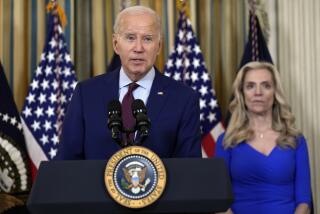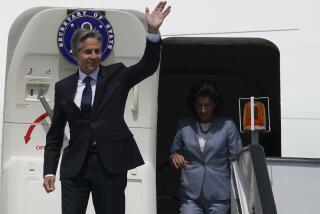U.S. Outlines Bold New Global Economic Policy
DAVOS,Switzerland — A large American delegation, led by President Clinton, signaled a more assertive U.S. international economic policy at the World Economic Forum that wrapped up here Tuesday.
By getting directly involved in their economies, the United States proposes to help the poorest countries win access to global investment capital by working on programs to forgive their current debts, tending to the health and education of their children and pushing harder for higher labor and environmental standards.
The policy implicitly declares that free markets alone are inadequate to raise up the world’s poor. It is aimed at forestalling another collapse of the poorest developing economies and at lessening opposition in the U.S to global trade and economic initiatives.
The president, Secretary of State Madeleine Albright, Treasury Secretary Lawrence Summers and other administration officials all sounded similar themes in speeches and meetings here over the last five days:
The gap between rich and poor nations is widening as economies in the industrialized and some areas of the developing world accelerate on the wings of new technology, while the poorest nations--in Africa, Latin America and parts of Asia--remain trapped in poverty, disease and illiteracy for vast numbers of their people.
The U.S. response to such afflictions is to be far more aggressive than in the past. Clinton called for U.S. tax credits for pharmaceutical and other companies to provide vaccines against killer diseases such as AIDS, malaria and tuberculosis.
Vaccines could save millions of lives. But the benefit would also be economically powerful because the billions of dollars now spent to care for the sick, or simply not available because ailing human beings cannot work and produce, would be freed up to build lives and societies, Clinton told 2,000 heads of state and business, government and labor officials assembled in this Alpine ski resort.
The vaccine effort was launched immediately with a $750-million pledge from the charitable foundation of Microsoft Corp.’s Bill and Melinda Gates.
The United States will be assertive in other ways, too, Treasury Secretary Summers told the forum in an address on Sunday. Developing economies will get debt relief so that money now going to interest payments can be devoted to development. But the U.S. government will see to it that savings from debt relief are channeled into human development.
“Along with their bank balances, we will look as well at the lives their children are leading, because social stability is a prerequisite for financial assistance,” Summers said.
“Markets alone won’t do the job, so we have to employ nonmarket methods in education, health,” explained Robert Hormats, vice chairman of Goldman Sachs and a former assistant secretary of State.
The new policy is not a foreign aid program. Rather, a main thrust is for government to act in support of private investment--the annual flows of hundreds of billions of dollars steered by investment bankers from the pension and mutual funds of rich countries to companies and projects in emerging markets.
“We will find new roles as supporters of large flows of investment capital for the International Monetary Fund, the World Bank and the World Trade Organization,” Summers said.
The World Bank already sees its role as supporting private investment, which in recent years has replaced governmental foreign aid as the chief source of development capital around the world.
Ten years ago, only $30 billion of private investment went to developing countries, along with $60 billion in World Bank funds. But the latest official figures, for 1997, “show $300 billion of private investment to only $45 billion in World Bank financing,” said James D. Wolfensohn, World Bank president, at a conference session here Monday night.
The flow of investment has changed the World Bank’s role. The institution, which once concentrated on building dams and other huge projects, now works to support local businesses. Wolfensohn, a former investment banker, also has involved the bank in building social infrastructures of “decent legal systems, honest judges and government officials.”
The new U.S. focus, with its greater emphasis on health, education and honest public finance, is similarly focused on helping poor societies develop their own institutions.
“It’s a new pattern of work targeted to each country’s needs, rather than broad trade agreements,” said Jeffrey Garten, dean of the Yale School of Management.
Garten, a former undersecretary of Commerce, believes that the proposed new round of global trade negotiations will be delayed because such broad endeavors “arouse so many opponents.”
The Clinton administration, asked here about its support for a new global round of trade talks, responded tentatively. “The president is not opposed to a new trade round,” said White House economic aide Gene Sperling, but “moving forward needs to be based on consensus.”
The shadow of last November’s trade talks debacle in Seattle, as well as the heart attack the Asian crisis gave the global economy in the late 1990s, formed a backdrop for the policies outlined by officials here.
The administration reiterated its support for examining labor and environmental standards in working groups of the WTO, as part of a general push to win backing from organized labor and the American public for international trade. Two U.S. trade agreements, one to promote investment in Africa and a free-trade agreement for countries of the Caribbean Basin, are now stalled in Congress.
The administration and backers of global trade and investment on the Republican side are planning a nationwide push to rally support for what Albright, in a speech here, called “an internationalist role for the United States.”
Despite the fact that the Clinton administration has less than a year left in office, its new policy is likely to endure because whichever party succeeds it in the White House will need a similar emphasis to deal with global economic problems.
In the early years of this new century, Summers warned, “99% of the labor force growth will be in the developing economies, [but] all of the world’s savings, seeking investments to finance retirement, will be in the developed countries.”
*
James Flanigan can be reached at [email protected].
More to Read
Sign up for Essential California
The most important California stories and recommendations in your inbox every morning.
You may occasionally receive promotional content from the Los Angeles Times.










